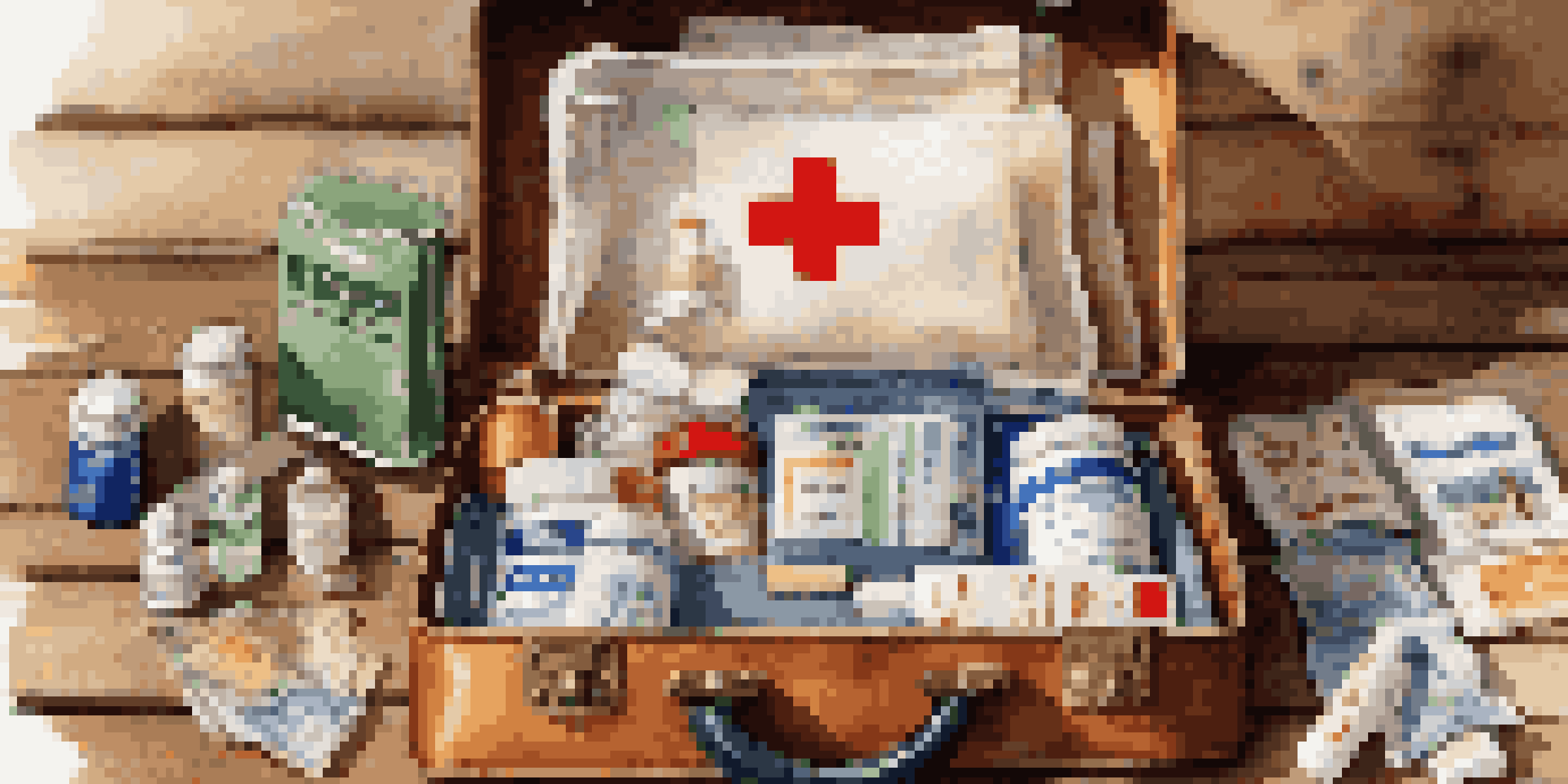Health and Safety: Seasonal Travel Precautions to Take

Understanding Seasonal Illnesses and Risks
When traveling during different seasons, it's crucial to be aware of seasonal illnesses that may arise. For instance, winter brings flu season, while summer can lead to heat-related issues. Understanding these risks can help you prepare and protect yourself effectively.
Traveling – it leaves you speechless, then turns you into a storyteller.
Traveling to new locations also exposes you to local health concerns, like allergies in spring or insect-borne diseases in summer. Researching your destination can provide insights into what precautions you should take. This knowledge empowers you to enjoy your trip without unnecessary worry.
By being informed about seasonal health risks, you can take proactive measures, such as getting vaccinations or packing appropriate medications. This step not only enhances your safety but also ensures that you have a more enjoyable and worry-free travel experience.
Packing the Right Health Essentials
Packing wisely can make a significant difference in ensuring your health while traveling. Start with a basic first-aid kit that includes band-aids, antiseptic wipes, and any personal medications you may need. This simple addition can save you from unexpected health issues.

Don’t forget to include season-specific items, like sunscreen for summer or cold medications for winter. Also, consider packing allergy medications if you're prone to seasonal allergies. Being prepared with the right supplies allows you to handle minor health concerns quickly.
Be Aware of Seasonal Risks
Understanding seasonal illnesses and local health concerns can help you prepare effectively for a worry-free travel experience.
Lastly, remember to pack any necessary documents, such as vaccination records or prescriptions, especially when traveling internationally. Having everything organized not only helps in emergencies but also provides peace of mind during your travels.
Staying Hydrated During Your Travels
Staying hydrated is crucial for maintaining your health while traveling, regardless of the season. Dehydration can lead to fatigue and other health issues, which can significantly dampen your travel experience. Make it a habit to drink water regularly, especially in hot weather or during long flights.
The journey not the arrival matters.
Consider carrying a reusable water bottle to help you stay on track. Many airports and travel destinations now offer water refill stations, making it easier to keep hydrated on the go. Staying proactive about your hydration can help you feel more energized and ready to explore.
Additionally, be mindful of the drinks you choose. While it’s tempting to indulge in sugary or caffeinated beverages, they can actually dehydrate you. Opt for water or electrolyte-rich drinks to keep your body functioning optimally during your adventures.
Prioritizing Food Safety While Traveling
Food safety is a major concern when it comes to traveling, particularly in unfamiliar places. Different countries have various food handling and preparation standards, which can sometimes lead to foodborne illnesses. Always choose well-reviewed restaurants and avoid street food if you're unsure about its safety.
Make it a point to wash your hands before eating or snack on foods that don’t require direct handling. Carry hand sanitizer for those moments when soap and water aren't available. These small practices can greatly reduce your chances of getting sick while enjoying local cuisine.
Pack Health Essentials
Bringing a well-stocked first-aid kit and season-specific items ensures you can handle minor health issues while traveling.
If you're traveling to a destination with specific dietary restrictions or food allergies, doing a bit of research can also help. Knowing what ingredients to avoid or where to find safe options can make your culinary experience enjoyable and stress-free.
Sun Protection: A Must for Seasonal Travelers
Regardless of the season, protecting your skin from the sun is essential. Sunburn can spoil your vacation, and prolonged exposure can lead to serious health issues. Always apply a broad-spectrum sunscreen with an SPF of 30 or higher, even on cloudy days.
Reapplying sunscreen every two hours, or more frequently if you're swimming or sweating, is crucial for maintaining protection. Don’t forget to cover often-overlooked areas like your ears, neck, and the tops of your feet. A simple hat and sunglasses can also provide added protection and comfort.
In winter, remember that UV rays can reflect off snow, leading to sunburn just as easily as in summer. Being vigilant about sun protection year-round will help ensure that your skin remains healthy, allowing you to fully enjoy your travels.
Navigating Travel Insurance for Health Coverage
Travel insurance is a vital component of any health and safety plan when traveling. It provides peace of mind by covering unexpected expenses like medical emergencies, trip cancellations, or lost luggage. Before traveling, evaluate your options and choose a policy that fits your needs.
Look for coverage that includes health-related incidents, especially if you're participating in activities like hiking or skiing. Make sure to read the fine print regarding exclusions or limitations. Knowing what you’re covered for can make all the difference in an emergency.
Stay Hydrated and Safe
Regular hydration and mindful food choices are essential for maintaining your health and enjoying your travels.
Additionally, always keep your insurance information handy during your travels. Having quick access to your policy details can streamline the process if you need to file a claim or seek medical attention. Being prepared is key to enjoying your travel experience worry-free.
Recognizing and Managing Stress While Traveling
Traveling can be exhilarating, but it can also bring about stress, especially during busy seasons. Whether it’s flight delays, packing, or navigating unfamiliar places, stress can take a toll on your overall health. Recognizing your stress triggers can help you manage them effectively.
Incorporating relaxation techniques like deep breathing, mindfulness, or even short breaks can help you stay calm during your journey. Consider scheduling some downtime in your itinerary to recharge and enjoy your surroundings without feeling rushed.

Remember, it's normal to feel overwhelmed at times, but taking proactive steps to manage stress can enhance your travel experience. By prioritizing your mental well-being, you can fully immerse yourself in new adventures and create lasting memories.
Emergency Contacts and Preparedness
Being prepared for emergencies is a critical aspect of health and safety while traveling. Before you leave, compile a list of important contacts, including local emergency services, your country's embassy, and trusted friends or family members. Having this information readily available can be a lifesaver.
Additionally, consider downloading local apps that can assist in emergencies, such as maps, translation tools, or healthcare resources. Familiarizing yourself with these tools before your trip can ease anxiety and help you navigate unforeseen situations.
Lastly, communicate your travel itinerary with someone you trust back home. Regular check-ins can provide an extra layer of security, allowing loved ones to know your whereabouts. Preparedness and communication are key to a safe and enjoyable travel experience.